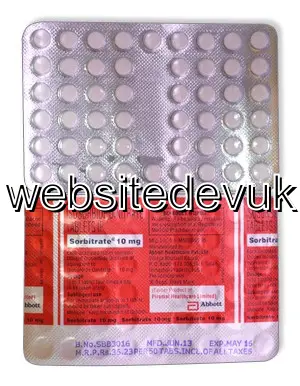Buy Isosorbide Dinitrate UK
| Package | Dosage | Price | Price per Dose | |
|---|---|---|---|---|
| Dosage: 10mg | ||||
| 360 pill | 10mg | £281.35 | £0.78 | |
| 180 pill | 10mg | £153.37 | £0.85 | |
| 120 pill | 10mg | £112.34 | £0.94 | |
| 90 pill | 10mg | £90.85 | £1.01 | |
| 60 pill | 10mg | £66.42 | £1.10 | |
| 30 pill | 10mg | £37.11 | £1.22 | |

Isosorbide Dinitrate Description
Introduction to Isosorbide Dinitrate
Isosorbide Dinitrate is a medication primarily used to prevent and manage angina pectoris, a condition characterized by chest pain resulting from reduced blood flow to the heart. It belongs to the nitrate class of drugs, which work by dilating blood vessels to improve circulation and reduce the heart's workload. This medication is often prescribed to patients with chronic angina or to prevent angina attacks in individuals with coronary artery disease.
How Does Isosorbide Dinitrate Work?
The active ingredient, Isosorbide Dinitrate, relaxes the smooth muscles in blood vessel walls. By converting into nitric oxide in the body, it activates a series of chemical reactions that lead to vasodilation. The widening of blood vessels decreases vascular resistance and allows blood to flow more easily. As a result, the heart doesn't have to work as hard, which can reduce the frequency and intensity of anginal episodes. This mechanism makes the medication effective in improving oxygen supply to the heart muscle and relieving chest pain.
Usage and Dosage
Isosorbide Dinitrate is usually taken orally, in the form of tablets. The dosage depends on the severity of the condition and the patient's response to treatment. Doctors often recommend starting with a low dose to minimize side effects and gradually increasing it as needed. It’s important to follow the prescribed schedule and avoid sudden discontinuation without medical guidance. The medication is generally taken on an as-needed basis or regularly, as directed by a healthcare professional.
Benefits and Efficacy
Patients often experience rapid relief from angina symptoms after taking Isosorbide Dinitrate. It is effective in providing quick symptom relief and in preventing recurrent angina attacks. Many users report improved quality of life because of better symptom control and the ability to engage in daily activities with less chest pain. Long-term use can help prevent serious complications related to coronary artery disease, such as heart attacks, by maintaining better blood flow to the heart muscle.
Potential Side Effects
Although generally well tolerated, Isosorbide Dinitrate can cause side effects in some users. Common adverse reactions include headaches, dizziness, flushing, and lightheadedness. These effects are often temporary and tend to diminish over time. Some individuals may experience low blood pressure or fatigue, especially if they take higher doses. Serious side effects are rare but can include allergic reactions or fainting episodes. Patients should report any unusual symptoms to their healthcare provider promptly.
Precautions and Interactions
Before starting treatment with Isosorbide Dinitrate, it is essential to inform your doctor about any existing health conditions, especially low blood pressure, glaucoma, or anemia. It is also important to disclose other medications being taken, as certain drugs, such as phosphodiesterase inhibitors used for erectile dysfunction, can interact dangerously with nitrates, leading to severe drops in blood pressure. Alcohol consumption should be limited, as it can enhance the medication’s side effects and impair its effectiveness.
Conclusion
In summary, Isosorbide Dinitrate is a valuable medication for controlling angina symptoms and preventing heart-related complications. Its mode of action effectively improves blood flow and reduces the heart's workload. Patients should adhere strictly to medical advice regarding dosage and usage instructions to maximize benefits and minimize side effects. Regular consultation with healthcare providers is essential to monitor the treatment’s progress and make necessary adjustments. Proper management of side effects and understanding of potential interactions can help ensure a safe and effective treatment experience.